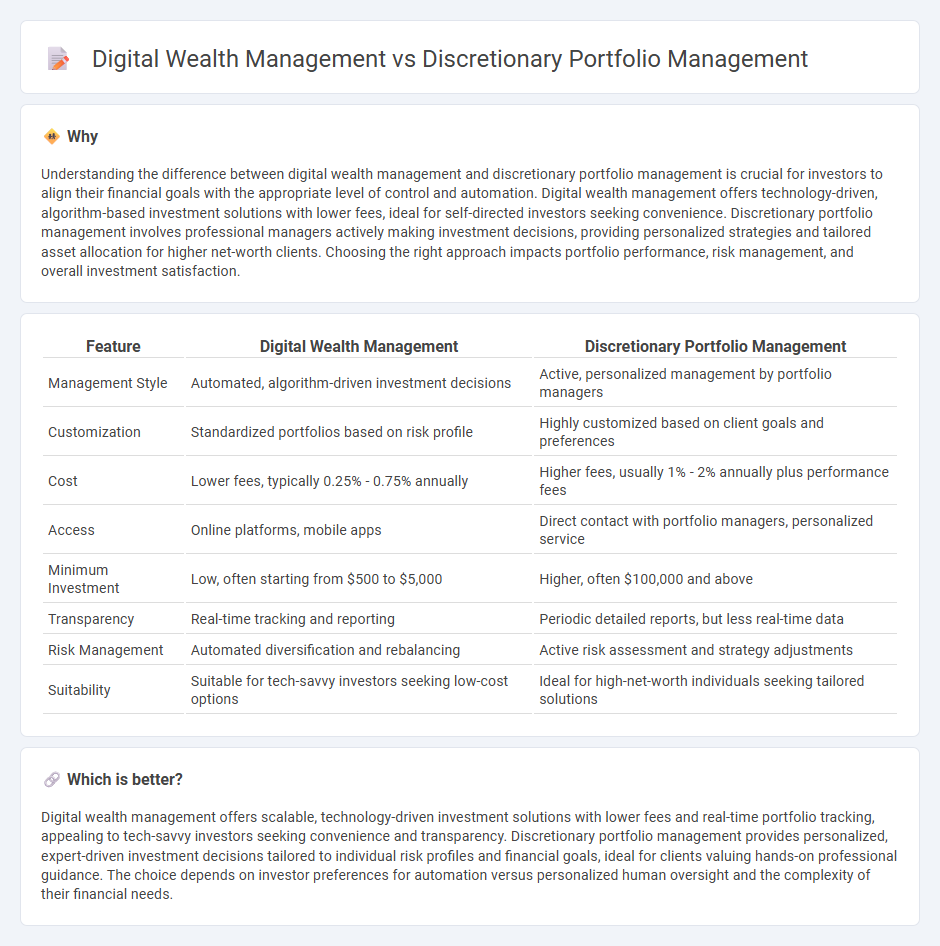
Digital wealth management leverages advanced algorithms and AI-driven platforms to provide personalized investment strategies with lower fees and real-time portfolio monitoring. Discretionary portfolio management involves professional fund managers making active decisions on behalf of clients to optimize returns based on market conditions and individual risk profiles. Explore how each approach can align with your financial goals and investment preferences.
Why it is important
Understanding the difference between digital wealth management and discretionary portfolio management is crucial for investors to align their financial goals with the appropriate level of control and automation. Digital wealth management offers technology-driven, algorithm-based investment solutions with lower fees, ideal for self-directed investors seeking convenience. Discretionary portfolio management involves professional managers actively making investment decisions, providing personalized strategies and tailored asset allocation for higher net-worth clients. Choosing the right approach impacts portfolio performance, risk management, and overall investment satisfaction.
Comparison Table
| Feature | Digital Wealth Management | Discretionary Portfolio Management |
|---|---|---|
| Management Style | Automated, algorithm-driven investment decisions | Active, personalized management by portfolio managers |
| Customization | Standardized portfolios based on risk profile | Highly customized based on client goals and preferences |
| Cost | Lower fees, typically 0.25% - 0.75% annually | Higher fees, usually 1% - 2% annually plus performance fees |
| Access | Online platforms, mobile apps | Direct contact with portfolio managers, personalized service |
| Minimum Investment | Low, often starting from $500 to $5,000 | Higher, often $100,000 and above |
| Transparency | Real-time tracking and reporting | Periodic detailed reports, but less real-time data |
| Risk Management | Automated diversification and rebalancing | Active risk assessment and strategy adjustments |
| Suitability | Suitable for tech-savvy investors seeking low-cost options | Ideal for high-net-worth individuals seeking tailored solutions |
Which is better?
Digital wealth management offers scalable, technology-driven investment solutions with lower fees and real-time portfolio tracking, appealing to tech-savvy investors seeking convenience and transparency. Discretionary portfolio management provides personalized, expert-driven investment decisions tailored to individual risk profiles and financial goals, ideal for clients valuing hands-on professional guidance. The choice depends on investor preferences for automation versus personalized human oversight and the complexity of their financial needs.
Connection
Digital wealth management integrates advanced algorithms and data analytics to offer personalized financial advice, enhancing the efficiency and accessibility of discretionary portfolio management. Discretionary portfolio management relies on digital platforms to automate asset allocation and real-time monitoring, optimizing investment decisions based on client-specific risk profiles and market conditions. The synergy between these technologies enables financial institutions to deliver tailored investment strategies with improved transparency and scalability.
Key Terms
Investment Strategy
Discretionary portfolio management offers personalized investment strategies tailored by professional fund managers who actively adjust asset allocations based on market conditions and client goals. Digital wealth management utilizes algorithm-driven models and artificial intelligence to create optimized portfolios, providing cost-effective, scalable solutions with automated rebalancing and risk management. Explore the key differences in investment approaches and discover which strategy aligns with your financial objectives.
Automation
Discretionary portfolio management relies heavily on expert human judgment for asset allocation and investment decisions, offering tailored strategies but limited automation. Digital wealth management platforms leverage advanced algorithms and artificial intelligence to automate portfolio rebalancing, risk assessment, and personalized financial planning. Discover how automation transforms investment management efficiencies and client experiences by exploring the nuances between these approaches.
Personalization
Discretionary portfolio management offers highly personalized investment strategies tailored by professional portfolio managers based on clients' unique financial goals, risk tolerance, and market conditions. Digital wealth management platforms leverage AI-driven algorithms to customize portfolios but typically provide less nuanced personalization compared to human-managed discretionary services. Explore the benefits and differences of personalized portfolio management by discovering more about each approach.
Source and External Links
Discretionary investment management - Wikipedia - Discretionary portfolio management involves investment managers making buying and selling decisions on behalf of clients using their own judgment within an agreed mandate, aiming to outperform benchmarks while tailoring risk and objectives for institutional or high-net-worth clients.
Discretionary Investment Management - Corporate Finance Institute - It refers to an investment style where portfolio managers have the authority to make investment decisions independently, requiring high trust and accountability, as they manage client assets with discretion over transactions.
Discretionary Portfolio Management | HSBC Private Bank - This service allows investors to define their investment goals and risk tolerance while delegating day-to-day decision-making to professional managers who actively manage diversified portfolios globally in line with these objectives.
 dowidth.com
dowidth.com